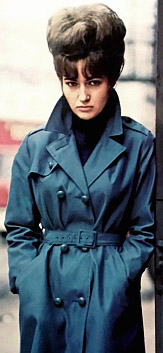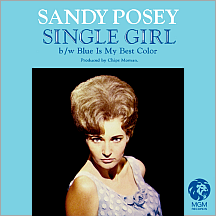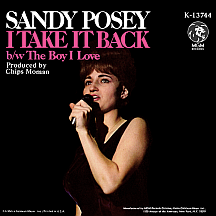SANDY POSEY
Single Girl
Consider Sandy Posey's plight: the lyrics of her most popular hits have been known to be off-putting to some. A woman friend of mine once reacted with a scornful "Ewww..." while listening to Sandy's 1966 debut single "Born a Woman": 'It makes no difference if you're rich or poor, or if you're smart or dumb...a woman's place in this ol' world is under some man's thumb.' This "Pickin'-Poseys Girl," as she called the singer, was not speaking to her feminist side. I had first heard the song as a kid; hey, I just thought it had a cool reference to "Under My Thumb," a then-current and much-played top 40 track by my band of adolescent choice, The Rolling Stones. Only later did I take note of its harsher context: '...if you're born a woman, you're born to be hurt...you're born to be stepped on, lied to, cheated on and treated like dirt,' a representation, unfortunately, of an all-too-common segment of the population in the '60s and, hopefully to a lesser degree, now. Songwriter Martha Sharp wrote those lyrics; no telling what sort of dark personal reality may have inspired them. Sandy delivered the lines convincingly, setting a precedent for more to follow, but the submissive roles she portrayed in song (and parlayed into about a year's worth of solid record sales) weren't necessarily within her realm of experience as she'd developed through her school years into an ambitious boys-can-come-later type. Sandy was simply working any angle that might spark a singing career; perhaps she could have been a pretty successful actress as well.
Sandy, a Jasper, Alabama native raised in West Memphis, Arkansas, just across the Mississippi River from Elvis Presley's Memphis, Tennessee stomping grounds, worked in 1965 as a singer with the Nashville-based Hit Records, a label that cranked out quickie cover versions of the day's hottest songs for the still-a-little-too-high price of 39 cents. Her recordings of smashes by the likes of Petula Clark, Nancy Sinatra and Cher were sent out under interchangeable aliases like Betty York, Betty Richards, Sherri York and, in at least one instance, Sandy, though certain names could have also been assigned to other singers. A few who toiled at Hit went on to have popular careers and Posey was one of them. Determination got her into the studio with producer Bill Justis, which resulted in a spring '65 teen pop single on Bell, "Kiss Me Goodnight," released under the name Sandy Carmel. By early '66 she was making the rounds of Memphis, Nashville and Muscle Shoals studios before landing a job as a receptionist at Lincoln Wayne "Chips" Moman's record-making operation back in Memphis. Martha Sharp's "Born a Woman" came to Moman's attention and he had to produce the song...if only he could find the right singer. She happened to be right under his nose.
Southern boy Moman hailed from LaGrange, Georgia, a guitar player with the chops to get hired for recording dates in Los Angeles and Memphis during the late 1950s. He toured with several rock acts (Gene Vincent was one) and got on Jim Stewart's good side around 1960, leading to a gig as a producer for Jim's soon-to-be-famous Memphis label Stax. Chips was a competitive cuss; by '66 he'd opened American Recording Studios (later American Sound Studio) on Thomas Street in Memphis, placing himself in a southern standoff with Stax on McLemore. Before Aretha Franklin, Joe Tex and chart-topping band The Box Tops worked their magic at American, Chips recorded Sandy Posey's breakthrough effort in a small Florence, Alabama studio (with top-notch musicians, including bassist Tommy Cogbill and former Presley guitarist Scotty Moore) just prior to the opening of his own facility. Sandy's heartfelt vocal had just a twinge of country in it; released by MGM, the first under her own name, it reached number 12 on Billboard's pop chart in September '66. Songster Sharp, peddling her wares two hundred miles away in Nashville, hadn't yet met the singer when "Born a Woman" became the first hit for both, but before long they would meet up in Nashville and repeat the process with similar results.

Sharp softened the stabbing submissiveness of the previous hit with "Single Girl," bypassing any male presence by simply providing a longing for such ('The single girl needs a sweet lovin' man to lean on...') while retaining an element of contempt ('...I know all about men and their lies...'), suggesting Martha's real agenda, as delivered with soulful fragility by Sandy, might not be so much about portraying women as lonely and dependent, but to make a point that "all" males are liars, cheats, mistreaters...and lovers, too (can't live with 'em...can't...?). As a man, the notion makes me bristle somewhat...but there certainly isn't enough evidence to contradict it. This second disc peaked at number 12 in December. Martha Sharp penned one other major hit, "Come Back When You Grow Up," a "comeback" record of sorts for Bobby Vee in the summer of '67 (Sandy was a songwriter too; "Single Girl" flip "Blue is My Best Color" is hers). In the liner notes of one of Sandy's later albums, Martha admitted she "got lazy" and didn't write any more material for Ms. Posey; in 1973, Sharp recorded her own versions of the two singles that had put her on the map.
John D. Loudermilk provided Sandy with her third straight top 40 entry, "What a Woman in Love Won't Do," featuring a cool Memphis horn section underscoring a predictable domestic issue ('At times I've caught you lyin'...with your bare face hangin' out!') in keeping with Sharp's barbs and providing a no-punches-pulled response ('Could it be...that I'm leavin'...or bein' untrue too, like you?'). In early '67 Sandy achieved the unexpected, picking up two Grammy nominations for "Born a Woman," suddenly tossed into competition with big stars Ella, Barbra and Dusty, Nancy-and-her-"Boots" and leading male singers Bobby Darin and Paul McCartney (who was nominated as a solo act for a recording released under The Beatles' name...?!?).
Come summertime '67 and Sandy was back with another radio single, a spoken-and-sung, forceful-but-backpedaling juxtaposition by Classics IV composers Buddy Buie and James Cobb called "I Take it Back." Sung: 'My love for you is dyin'...' Spoken: 'Oh no, please don't start cryin'!' Poor Sandy, so conflicted! The song was a hit, topping out at number 12...again?! Sung: 'I can't go on another day...' Spoken: 'Oh please, don't look at me that way!' With this well-produced exercise in waffling, she became something like the "Mistress of the Triple-12"...no one else has ever done that, at least not without having at least one higher-charting hit. As for any anti-feminist relationship themes in her music, she was simply doing whatever she felt might result in a hit record.
There were a couple of lower-charting singles, "Are You Never Coming Home" and "Something I'll Remember," and by early 1969 Sandy was off the MGM label. Returning to studio work, she backed quite a few big artists, the highlight coming with her backing vocals on two Presley albums, From Elvis in Memphis (with the hit "In the Ghetto") and Elvis Back in Memphis, both recorded at Chips Moman's American Sound Studio. Sandy Posey jumped back into the fray in 1971, crossing the line into the C&W field under producer Billy Sherrill with the country hit "Bring Him Safely Home to Me." Moving from Columbia to Monument to Warner Bros. Records, she had several other country hits through decade's end, alternating her trademark relationship material with classic oldies: Elvis's "Don't," The Tune Weavers' standard "Happy, Happy Birthday Baby" and The Chordettes' classic "Born to Be With You."



